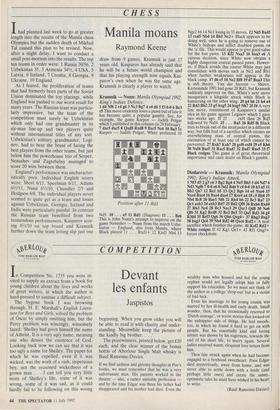CHESS
Manila moans
Raymond Keene
Ihad planned last week to go at greater length into the results of the Manila chess Olympics but the sudden death of Mikhail Tal caused this plan to be revised. Now, after a slight delay, I want to conduct a small post-mortem into the results. The top ten teams in order were: 1 Russia 39/56, 2 Uzbekistan 35, 3 Armenia 341/2, 4 USA, 5 Latvia, 6 Iceland, 7 Croatia, 8 Georgia, 9 Ukraine, 10 England.
As I feared, the proliferation of teams that had formerly been parts of the Soviet Union dominated the top placings, while England was pushed to our worst result for many years. The Russian team was particu- larly impressive, but the team of the competition must surely be Uzbekistan which only had one grandmaster in its six-man line-up and two players quite without international titles of any sort. Uzbekistan's solitary grandmaster, Logi- nov, had to bear the brunt of facing the best players from the other teams, but just below him the powerhouse trio of Serper, Nenashev and Zagrebelny managed to score 20 wins between them.
England's performance was uncharacter- istically poor. Individual English scores were: Short 6/11, Speelman 6/11, Adams 61/2/11, Nunn 61/2/10, Chandler 2/5 and Hodgson 6/8. The individual players never seemed to quite gel as a team and losses against Uzbekistan, Georgia, Iceland and India were particularly painful. In contrast the Russian team benefited from two tremendous performances, Kasparov scor- ing 81/2/10 on top board and Kramnik further down the team letting slip just one draw from 9 games. Kramnik is just 17 years old. Kasparov has already said that he will be a future world champion and that his playing strength now equals Kas- parov's own when he was the same age. Kramnik is clearly a player to watch.
Kramnik — Nunn: Manila Olympiad 1992; King's Indian Defence.
1 d4 Nf6 2 c4 g6 3 Nc3 Bg7 4 e4 d6 5 f3 0-0 6 Be3 c5 This move evidently loses a pawn but of late it has become quite a popular gambit. See, for example, the game 1Carpov — Judith Polgar which I published in this column on 29 February. 7 dxc5 dxc5 8 Qxd8 Rxd8 9 Bxc5 Nc6 10 Ba3 In Karpov — Judith Polgar, White preferred 10
Position after 11 Rdl
Nd5. 10 . . . a5 11 Rdl (Diagram) 11 . . . Be6 This is John Nunn's attempt to improve on the game Nenashev — Nunn from the match Uzbe- kistan — England, also from Manila, where Black played 11 . . . Rxd1+ 12 Kxd 1 Nb4 13 Nge2 b6 14 Ncl losing in 33 moves. 12 Nd5 Bxd5 13 cxd5 NM 14 Bb5 Nc2+ Black appears to be doing well, since he is going to remove one of White's bishops and inflict doubled pawns on the 'a' file. This would appear to give good value for the lost pawn. 15 K12 Nxa3 16 bxa3 e6 A curious decision, since White now obtains a highly dangerous central passed pawn. Howev- er, if Black avoids this course White may just consolidate with moves such as Ne2 and Rbl when further weaknesses will appear in the black camp. 17 d6 e5 18 Ne2 Bf8 19 d7 Bxa3 This is still theory. Van der Sterren — Shirov, Kerteminde 1991 had gone 20 Rd3, but Kramnik suddenly improves on this. White's next move inaugurates a kingside attack while Black is hamstrung on the other wing. 20 g4 h6 21 h4 a4 22 Rd3 Bb2 23 g5 hxg5 24 hxg5 Nh7 25 f4 A very fine move, reminiscent of Kasparov's similar idea in his game against Loginov which I gave two weeks ago. If 25 . . . exf4 then 26 Itc15 followed by Nxf4. 25 . . . Ra5 26 Rd5 f6 Black tries to break out of the straitjacket in a different way, but falls foul of a sacrifice which creates an overwhelming mass of central pawns, the coronation of at least one of which cannot be prevented. 27 Rxh7 Kxh7 28 gxf6 exf4 29 e5 Kh6 30 Nxf4 Bxe5 31 Rxe5 Rxd7 32 Bxd7 Rxe5 33 17 Black resigns This game is of great theoretical importance and casts doubt on Black's gambit.
Dizdarevic — Kramnik: Manila Olympiad 1992; King's Indian Attack.
1 Nf3 d5 2 g3 c6 3 Bg2 Bg4 4 Ne5 Bh5 5 d4 Nd7 6 Nd3 Ngf6 70-0 e6 8 Nd2 Bd6 9 c4 0-010 b3 a5 11 Bb2 Qe7 12 Rel b5 13 Qc2 Bg6 14 e4 Nxe4 15 Nxe4 Bxe4 16 Bxe4 dxe4 17 Rxe4 a4 18 c5 Bb8 19 NM Rc8 20 Rael Nf6 21 Rh4 h6 22 Bc3 Ra7 23 Qcl axb3 24 axb3 Rd7 25 Bd2 Qf8 26 Rxh6 Rxd4 27 Rh3 Ne4 28 Bc3 Nxc3 29 Qxc3 Qd8 30 Na6 Qf6 31 Kg2 Rcd8 32 Re3 Be5 33 Qa5 Rd3 34 g4 R3d4 35 Re13 Qg6 36 Qb6 Qxg4+ 37 Rhg3 Bxg3 38 hxg3 Qe4 39 NM Rd2 40 Qxc6 Rxf2+ A neat sacrifice which finishes the game. 41 Kxf2 Rd2+ White resigns If 42 Kgl Qel + 43 Rfl Oxg3+ forces checkmate.


















































 Previous page
Previous page